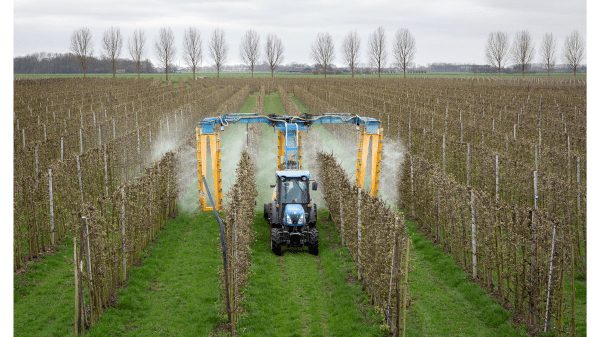It’s summer, so of course there are stacks of Roundup bottles at your home improvement store.
People buying Roundup, aka glyphosate, to spray on backyard dandelions may not be aware of a new Supreme Court decision affecting their favorite herbicide. But agriculture groups are likely aware, and they say the decision could harm growers in several ways.
Or rather, nondecision.
On Tuesday, June 21, the Supreme Court chose not to hear a lawsuit brought against the herbicide’s maker, Bayer, by Edwin Hardeman, who developed non-Hodgkin’s lymphoma in 2015. His suit charged that his cancer was caused by his use of Roundup over two decades.
An appeals court upheld the jury’s original verdict that Hardeman’s illness was caused by exposure to the herbicide. He was awarded $25 million.
Bayer appealed the ruling and brought it to the Supreme Court. The court’s refusal to hear the case means that the previous ruling stands.
“The Environmental Protection Agency has repeatedly concluded that glyphosate is unlikely to cause cancer in humans,” notes the Washington Post. “California’s labeling laws are more stringent. After an international research group classified glyphosate as ‘probably carcinogenic to humans’ in 2015, the state required a warning label for glyphosate-based pesticides. The classification prompted a spate of lawsuits against the manufacturer of the nation’s most widely used weed killer.”
The Supreme Court decision does not affect the availability of Roundup, which will continue to be sold.
But it does open the door for thousands of similar lawsuits against Bayer, which has found the popular and lucrative chemical something of a bad luck charm since its acquisition of Monsanto, Roundup’s original manufacturer, in 2018.
The decision is likely to disappoint the coalition of 54 agricultural organizations, including the International Fresh Produce Association, the Florida Fruit and Vegetable Association, and the Western Growers Association, that had written to President Biden in May about the case.
President Biden, of course, cannot dictate which cases the Supreme Court will or will not hear. The ag groups were asking him to withdraw an amicus brief submitted on May 18 by Solicitor General Elizabeth Prelogar urging the high court not to take up the case, arguing that federal pesticide regulations do not prevent states from issuing additional labeling requirements.
“The Solicitor General’s conclusion risks undermining how herbicide tools help farmers to produce more and do so sustainably,” said the letter. “By opening the door to an impractical patchwork of state pesticide labeling requirements, farmer and user access to these tools would be threatened. Such action would reduce crop yields at a time when lives depend on us producing every bushel possible. It would also reduce the use of conservation practices that help to fight climate change, such as cover crops and decreased soil tillage.”



